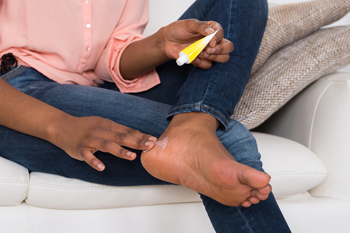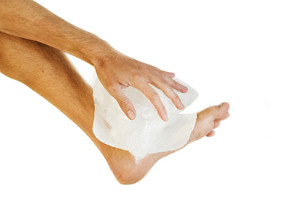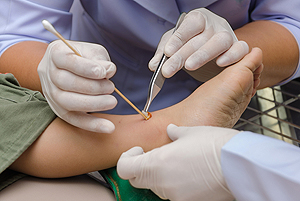Blog
Extensor Tendonitis May Cause Pain in the Top of Your Foot
Pain in the top of the foot can be caused from a variety of conditions, one of them being extensor tendinitis. Tendons are fibrous tissues that connect muscles to bone. Extensor tendons are located on the top of the feet. They connect bones in the toes to muscles on the front portion of the leg which work together to help raise your toes and flex your feet. These tendons can become inflamed and irritated from wearing tight, small, or non-supportive shoes, or from overuse. This condition, known as extensor tendonitis, can cause pain and swelling in the top of the feet that may worsen after activity. If you are experiencing this type of foot pain, it is a good idea to contact a podiatrist. After the examination, if it’s determined that you have extensor tendonitis, your doctor may prescribe a course of treatment that includes rest, anti-inflammatory medication, splinting, physical therapy, or even steroid injections.
Foot Pain
Foot pain can be extremely painful and debilitating. If you have a foot pain, consult with one of our podiatrists from Pennsylvania. Our doctors will assess your condition and provide you with quality foot and ankle treatment.
Causes
Foot pain is a very broad condition that could be caused by one or more ailments. The most common include:
- Bunions
- Hammertoes
- Plantar Fasciitis
- Bone Spurs
- Corns
- Tarsal Tunnel Syndrome
- Ingrown Toenails
- Arthritis (such as Gout, Rheumatoid, and Osteoarthritis)
- Flat Feet
- Injury (from stress fractures, broken toe, foot, ankle, Achilles tendon ruptures, and sprains)
- And more
Diagnosis
To figure out the cause of foot pain, podiatrists utilize several different methods. This can range from simple visual inspections and sensation tests to X-rays and MRI scans. Prior medical history, family medical history, and any recent physical traumatic events will all be taken into consideration for a proper diagnosis.
Treatment
Treatment depends upon the cause of the foot pain. Whether it is resting, staying off the foot, or having surgery; podiatrists have a number of treatment options available for foot pain.
If you have any questions, please feel free to contact one of our offices located in Plymouth Meeting and Ambler, PA . We offer the newest diagnostic and treatment technologies for all your foot care needs.
What to Do With a DFU
A DFU, or diabetic foot ulcer, is an unfortunately frequent complication of diabetes. Caused by a combination of high blood glucose levels, poor circulation, nerve damage, and immune insufficiency, DFUs are dangerous wounds that can form on the feet. These wounds typically heal slowly and poorly, and so they often require medical care. It is suggested that you call your podiatrist if you have a DFU and notice any new pain, drainage, discoloration, swelling, foul odor, or dead tissue at the site of the ulcer. You also may wish to seek medical treatment if the DFU increases in size or depth, or if it doesn’t heal. Some treatments that may help at the doctor’s office include debridement to remove dead tissue, medicated bandages, off-loading using orthotics, and surgery. If you have diabetes, it is suggested that you be under the regular care of a podiatrist.
Wound care is an important part in dealing with diabetes. If you have diabetes and a foot wound or would like more information about wound care for diabetics, consult with one of our podiatrists from Pennsylvania. Our doctors will assess your condition and provide you with quality foot and ankle treatment.
What Is Wound Care?
Wound care is the practice of taking proper care of a wound. This can range from the smallest to the largest of wounds. While everyone can benefit from proper wound care, it is much more important for diabetics. Diabetics often suffer from poor blood circulation which causes wounds to heal much slower than they would in a non-diabetic.
What Is the Importance of Wound Care?
While it may not seem apparent with small ulcers on the foot, for diabetics, any size ulcer can become infected. Diabetics often also suffer from neuropathy, or nerve loss. This means they might not even feel when they have an ulcer on their foot. If the wound becomes severely infected, amputation may be necessary. Therefore, it is of the upmost importance to properly care for any and all foot wounds.
How to Care for Wounds
The best way to care for foot wounds is to prevent them. For diabetics, this means daily inspections of the feet for any signs of abnormalities or ulcers. It is also recommended to see a podiatrist several times a year for a foot inspection. If you do have an ulcer, run the wound under water to clear dirt from the wound; then apply antibiotic ointment to the wound and cover with a bandage. Bandages should be changed daily and keeping pressure off the wound is smart. It is advised to see a podiatrist, who can keep an eye on it.
If you have any questions, please feel free to contact one of our offices located in Plymouth Meeting and Ambler, PA . We offer the newest diagnostic and treatment technologies for all your foot care needs.
What Causes Cracked Heels?
 Cracked heels affect up to 20 percent of adults in the United States. Although cracked heels are not usually a major issue, they can become very painful. Common factors that can cause cracked heels include standing for long periods of time, using harsh soaps, walking barefoot, dry skin, and wearing shoes that aren’t supportive. Cracked heels can also be caused by medical issues, such as vitamin deficiencies, fungal infections, obesity, or pregnancy. Common methods to prevent cracked heels include wearing shoes that do support the heel and are not too tight. Tips for relieving cracked heels are to stay hydrated, use a foot cream, and avoid standing for too long in one period. It is suggested that anyone with persistent and painful cracked heels consult with a podiatrist for a proper treatment method.
Cracked heels affect up to 20 percent of adults in the United States. Although cracked heels are not usually a major issue, they can become very painful. Common factors that can cause cracked heels include standing for long periods of time, using harsh soaps, walking barefoot, dry skin, and wearing shoes that aren’t supportive. Cracked heels can also be caused by medical issues, such as vitamin deficiencies, fungal infections, obesity, or pregnancy. Common methods to prevent cracked heels include wearing shoes that do support the heel and are not too tight. Tips for relieving cracked heels are to stay hydrated, use a foot cream, and avoid standing for too long in one period. It is suggested that anyone with persistent and painful cracked heels consult with a podiatrist for a proper treatment method.
If the skin on your feet starts to crack, you may want to see a podiatrist to find treatment. If you have any concerns, contact one of our podiatrists from Pennsylvania. Our doctors can provide the care you need to keep you pain-free and on your feet.
Cracked Heels
It is important to moisturize your cracked heels in order to prevent pain, bleeding, and infection. The reason cracked heels form is because the skin on the foot is too dry to support the immense pressure placed on them. When the foot expands, the dry skin on the foot begins to split.
Ways to Help Heal Them
- Invest in a good foot cream
- Try Using Petroleum Jelly
- Ease up on Soaps
- Drink Plenty of Water
Ways to Prevent Cracked Heels
- Moisturize After Showering
- Skip a Shower
- Keep Shower Water Lukewarm
- Don’t Scrub Your Feet
If you are unsure how to proceed in treating cracked heels, seek guidance from a podiatrist. Your doctor will help you with any questions or information you may need.
If you have any questions, please feel free to contact one of our offices located in Plymouth Meeting and Ambler, PA . We offer the newest diagnostic and treatment technologies for all your foot care needs.



